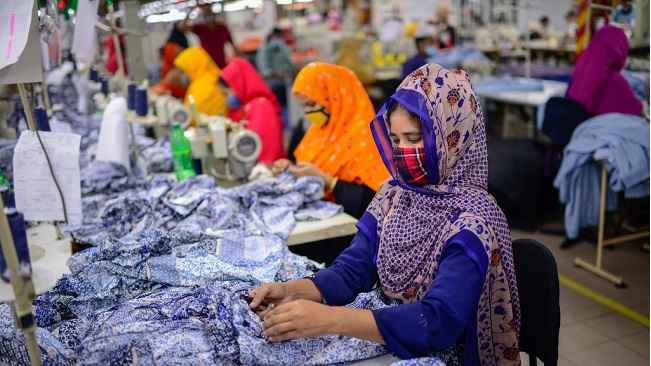Bangladesh’s economy is showing signs of a gradual recovery, although GDP growth remains under pressure, according to a Metropolitan Chamber of Commerce and Industry (MCCI) report on Wednesday.
Despite the sluggish pace, the economy is gradually moving towards recovery in the quarter under review (Q3 of FY25), it said in its “Review of Economic Situation in Bangladesh: January – March 2025 (Q3 of FY25)” released on the day.
Export earnings and remittance inflows are helping to stabilize the foreign exchange reserves and revitalize the rural economy – factors which are contributing positively to macroeconomic stability, the report also said.
Severe regulatory lapses in the banking sector and massive loan scams have delayed the recovery of the macroeconomy. However, recent efforts to reform the banking sector and restore public confidence in financial institutions will be vital to reviving GDP growth, it stated.
Export earnings rose by 10.52% year-on-year to $37.19 billion in the July–March period of FY25, up from $33.65 billion a year earlier. In March alone, export receipts climbed 11.36% year-on-year to $4.25 billion.
However, the MCCI said persistent regulatory lapses and extensive loan scams have hampered the pace of recovery.
It said ongoing banking sector reforms and steps to rebuild public confidence are vital for stimulating GDP growth.
Export earnings in July-March of FY25 increased by 10.52% to $37.19 billion from $33.65 billion in the corresponding nine months of the previous fiscal year.
However, overall export earnings in July-March of FY25 decreased by 0.61% against the strategic target ($37.42 billion).
Inflow of remittances crossed the $3 billion mark for the first time in history in March this year, which gave the much-needed impetus to the country’s depleting foreign currency reserves.
Remittances inflow in March 2025 registered $3,295.63 million, which was 65.02% higher compared to the same month of the previous fiscal year ($1,997.07 million).
Data on the country’s industry sector is yet to be available for the quarter under review (Q3 of FY25). However, the sector registered a higher growth of 7.10% in Q2 of FY25, compared to 2.44% in the previous quarter (Q1 of FY25).
According to Bangladesh Bank’s balance of payments latest data, the net inflows of FDI in July-March of FY25 decreased, year-on-year, by 26.03% to $861 million from $1,164 million.
Between end-June of FY24 and end-March of FY25, the value of the Taka depreciated by 3.28% against the US dollar.
On the inter-bank market, the US dollar was quoted at Tk118 at the end of June 2024 and Tk122.00 at the end of March 2025.
The services sector registered a higher growth of 3.78% in Q2 of FY25, compared to 2.41% in the previous quarter (Q1 of FY25).
According to the Bangladesh Bank (BB) data, broad money (M2) recorded a higher growth of 9.18% at the end of March 2025 compared to 8.92% growth achieved at the end of March 2024.
Domestic credit, on the other hand, grew by 9.19% at the end of March 2025, while a higher growth rate of 12.14% was recorded at the end of March 2024.
Total liquid assets of scheduled banks stood higher by 11.62% to Tk528,430 crore at the end of January 2025, compared with Tk473,404 crore at the end of June 2024.
The interest rate spread between the weighted average interest rate (WAIR) on advances and deposits of all banks moved up by 7 basis points to 5.87% in March 2025 compared to the previous month (5.80% in February 2025).
NBR’s tax revenue collection surged a bit by 2.76% or Tk6,894.53 crore to Tk256,486.84 crore in July-March of FY25 compared to Tk249,592.31 crore in July-March of FY24.
The revenue authority, however, fell short of its strategic target (Tk322,152.39 crore) by Tk65,665.55 crore or 20.38% in July-March of FY25.
After a straight three months’ of downward trend, the rate of general inflation (point to point) in March 2025, however, recorded a bit higher at 9.35% from 9.32% in the previous month (February), according to BBS’ latest data.
The latest data indicate that the agriculture sector employed about 44% of the country’s total labor force and accounted for about 11.68% of GDP in Q2 of FY25, compared to 10.27% in Q1 of FY25.

























